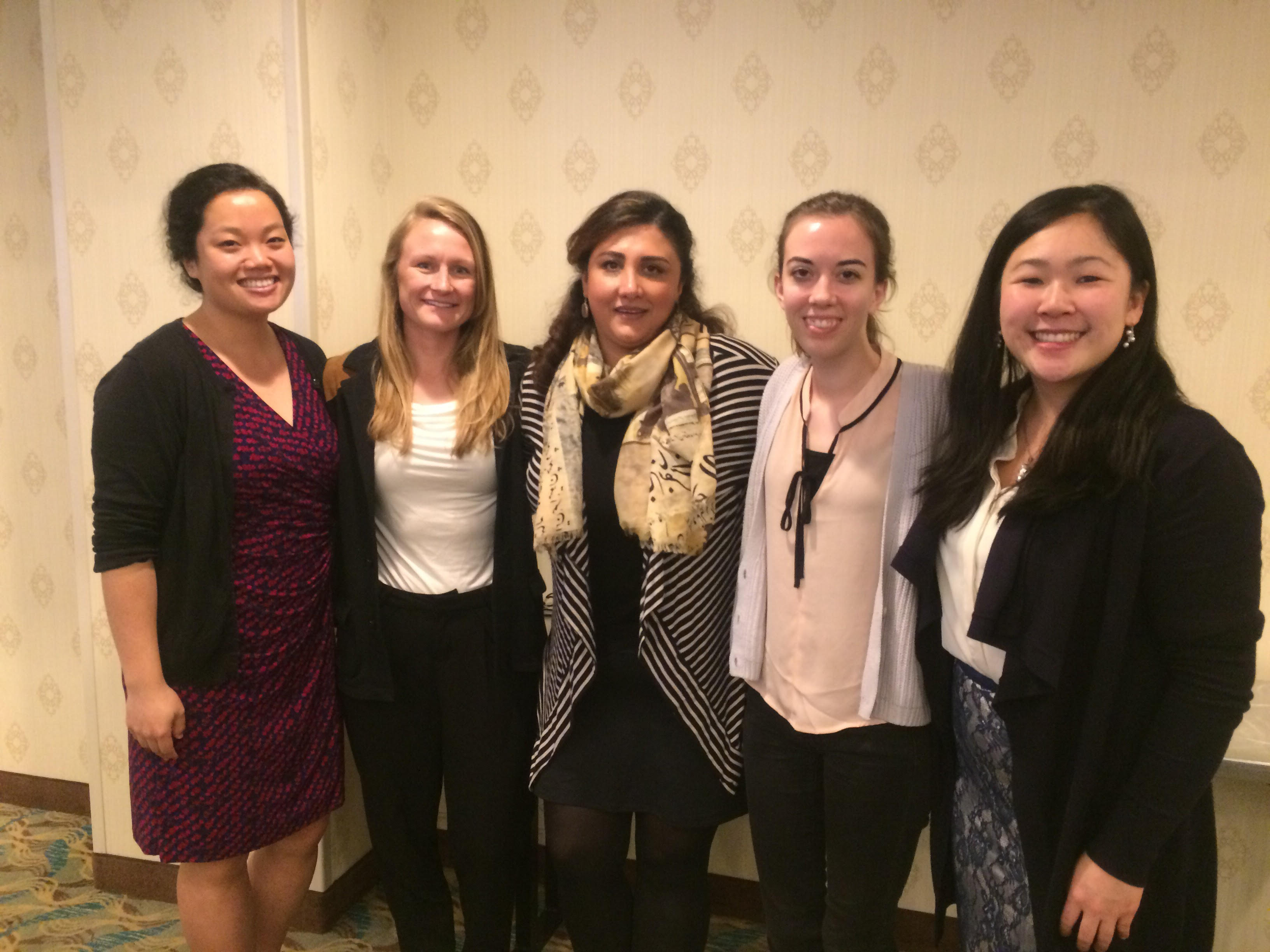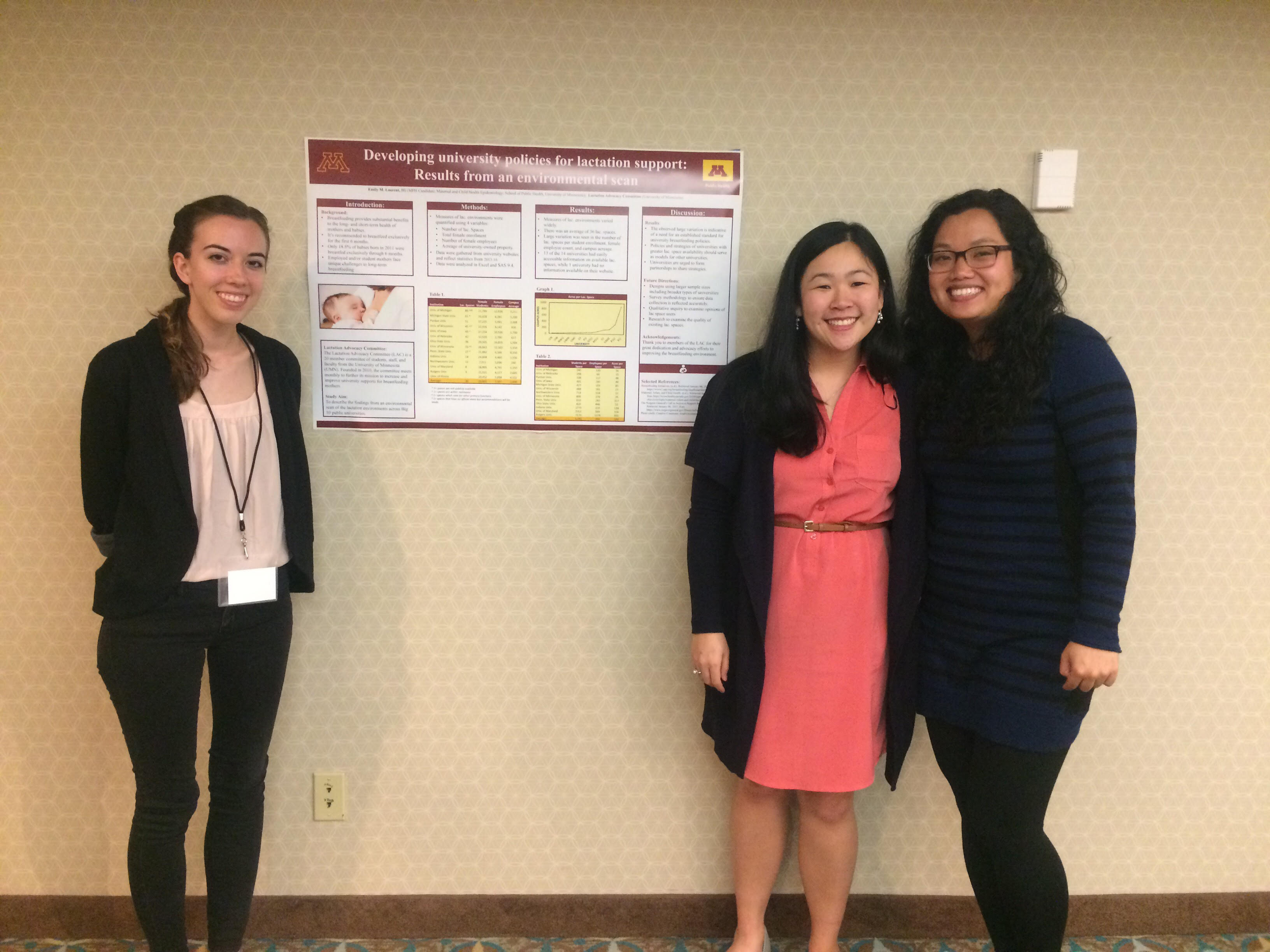A Center for MCH Interview with MCH Student Emily Laurent
Center Research Assistant, Kristen Wanta, had an opportunity to interview Emily Laurent about some of her interests and efforts, some of which provided Emily with an opportunity to present her work to a national audience of her peers. Read the interview below.
Q: Hi Emily! Before we get started why don’t you tell us about your background and what brought you to the UMN Maternal and Child Health (MCH) Program.
A: Hello! I came to the field of public health through a combination of interests in sociology and culture, social justice, and governmental services and programs. I have a background in sexual violence prevention, health education, and program evaluation research. My biggest interests lie in reproductive justice, gender equality, and social and behavioral determinants of health.
I chose the MCH program at UMN for the academic reputation and ranking as a top 10 School of Public Health, the opportunities to focus my training around MCH epidemiology, and the huge public health network within the Twin Cities. I also have had excellent opportunities to be a student worker at the Minnesota Department of Health, a member of the Minnesota Human Trafficking Task Force, and intern with the university’s Lactation Advocacy Committee (LAC).
 Q: It sounds like you have had several exciting experiences here. Tell us about the Making Lifelong Connections conference you attended in Spring 2017.
Q: It sounds like you have had several exciting experiences here. Tell us about the Making Lifelong Connections conference you attended in Spring 2017.
A: Definitely. This past spring I had the opportunity to attend the Making Lifelong Connections (MLC) conference in Seattle. The conference is hosted annually through the Maternal and Child Health Bureau (MCHB) as an opportunity to bring together current and former MCHB trainees from all over the country to build professional connections, enhance their career development, and to learn about the different opportunities in the field of Maternal and Child Health.
Q: How cool! How did you get the opportunity to attend this conference?
A: I heard about the conference through an email blast from the Center for MCH former director, Dr. Wendy Hellerstedt. I submitted an application detailing my background and interests in maternal and child public health along with an abstract from a research project I was working on. I was notified that I was accepted to attend and invited to present a poster of my research on university breastfeeding supports. I was so excited, and the Center for Leadership Education in Maternal and Child Public Health provided the funding for me to attend.
Q: What great news, congratulations again. What was your experience like at the MLC conference?
A: I truly had the best time. During the first day of the conference I presented my poster. It was my first  professional poster session, and it was an incredibly valuable opportunity to practice talking about my research. Day two of the conference was busy with professional presentations by other trainees as well as current leaders in the field of MCH, including three speakers from the MCHB. It was fascinating to learn about the diversity of projects other trainees were working on, but it was most valuable to hear from the MCHB representatives. It’s been a career goal of mine to work for the state or federal government in Title V administration, and to get to meet these MCH leaders and hear their presentations…well, let’s just say I fangirled a bit!
professional poster session, and it was an incredibly valuable opportunity to practice talking about my research. Day two of the conference was busy with professional presentations by other trainees as well as current leaders in the field of MCH, including three speakers from the MCHB. It was fascinating to learn about the diversity of projects other trainees were working on, but it was most valuable to hear from the MCHB representatives. It’s been a career goal of mine to work for the state or federal government in Title V administration, and to get to meet these MCH leaders and hear their presentations…well, let’s just say I fangirled a bit!
Another awesome aspect of the conference was forming relationships with other trainees. We had a speed networking event where we got to take turns answering questions about our backgrounds and career goals. It was nice to meet trainees from other Centers of Excellence and to learn about the different aspects of their MPH programs.
Lastly, it was neat to get to explore Seattle. Each day we had some downtime that we used to go explore the city together. We ate a lot of seafood, shopped at the infamous Pike Place Farmer’s Market, and even got to visit a local “pie bar.”
Q: That sounds like a great couple of days. Tell us a more about the research you presented.
A: My research involved an environmental scan of breastfeeding support environments across Big 10 universities. The implementation of the Affordable Care Act (ACA) mandated that employers provide a private, clean space other than a restroom for breastfeeding employees to express their milk in. However, college campuses are unique worksites due to their large geographical size and number of employees. Also, while federal policy exists to protect breastfeeding employees, no such policies exist to protect the rights of breastfeeding students who may be denied space to express their milk. With no policies in place for guidance, this project provided a look at what other universities are offering breastfeeding members oftheir campus communities.

I started this project through the university’s Lactation Advocacy Committee (LAC). I joined the committee as their Research and Policy Analysis Intern, and completed this project for the committee so we could see where we stood as a university in terms of how many lactation spaces we offer. I gathered data on the number of lactation spaces at each university, as well as the number of female students, faculty and staff, and acres of each campus property. What I found was quite surprising. The number of spaces at each university ranged from 0 to 89, and large variation was seen even among schools of similar enrollment, employee numbers, and geographic size. The data was indicative of a need for uniform policy development on required breastfeeding supports across large universities.
Q: That’s amazing! What an important and project,–we’re glad you got to be part of it. Before we wrap up, tell us what’s next for you in your public health career.
A: I’m planning to stay involved with the LAC and submit my research for publication. I’m also planning to dive deeper into some qualitative data from survey responses of lactation-space users. I had a Title V MCH Workforce Development Internship this past summer at the Community and Family Health Division within the Minnesota Department of Health, where I focused on the epidemiology of adolescent mental health. I loved it, and I’m planning to continue to work towards my career goals in governmental MCH epidemiology!
Emily Laurent is a second year MCH MPH student. She recently accepted a student worker position in the Family Home Visiting section of the Minnesota Department of Health (MDH) where she’ll be assisting the Evaluation Unit staff with the evaluation of Minnesota Family Home Visiting programs by collecting and analyzing data and developing reports, and helping with the planning, coordination, and execution of activities to support the quality and sustainability of home visiting in Minnesota.
Read Student Spotlight Archives
Interested in learning more about getting a degree in Maternal and Child Health? Visit our MCH Program page for more information.
#UMNMCH #UMNproud #UMNdriven